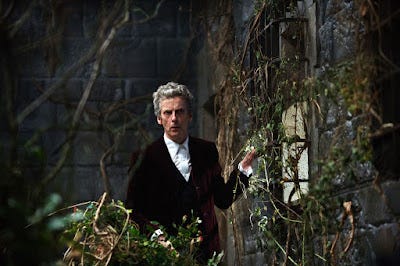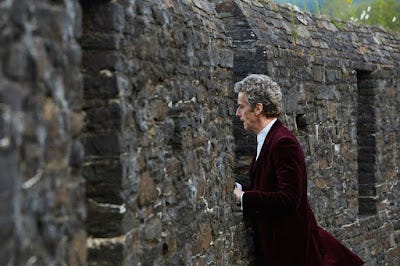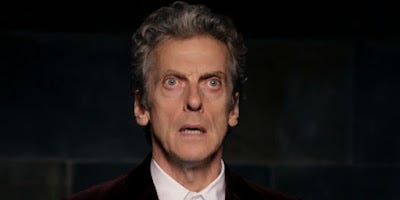"Doctor Who" Review: "Heaven Sent" (Series 9 Episode 11) - "Personally, I think that's a hell of a bird..."

I reviewed last week’s episode of Doctor Who, “Face the Raven,” in print given that we were unable to record the podcast after it aired. That’s not the case this week, and Sean and I will be getting together to record very soon, so we will be discussing tonight’s episode “Heaven Sent,” in full in a day or two. But “Heaven Sent” is an episode that knocked me out flat, more than any hour in this entire outstanding season, and the more I ponder it, the more I find myself wanting to write about it, if for no other reason than to work out my thoughts on what is, if nothing else, a tremendously audacious and challenging hour of television. So there will be a podcast discussion very soon, and I’m excited to hear Sean’s perspective on this one, but for now, I am itching to write – and I imagine fellow Doctor Who fans might be itching to discuss the episode as soon as possible, so why delay?
Spoilers for “Heaven Sent” coming up after the jump…
When I first opened my computer to type up some notes after watching “Heaven Sent,” every inch of my heart and mind pummeled by the experience, I found myself unsure of where to even begin. There is a lot to praise here, obviously, but even if one’s instinct is to jump straight into hyperbole, where does one start? You want to bow at the alter of Peter Capaldi, of course, because the work he does here, almost entirely on his own and with more pages of dialogue in one hour than most actors get in full seasons, is positively transcendent. But then, those words in his mouth are the work of Steven Moffat, who has imagined such a powerful and provocative scenario here, and realized it in such beautifully poetic fashion. But the words and the performance don’t get to live and breathe the way they do without director Rachel Talalay, who turns in what is quite probably the best-directed episode of Doctor Who in its 52 years of existence, a visual powerhouse that is paced and edited to perfection. But Talalay’s images and staging don’t come alive the way they do without composer Murray Gold, who after a decade spent scoring this series delivers his best single-episode work to date in an episode that is arguably driven every bit as much by music as it is by Capaldi’s performance. And really, when you stand back and consider it all, you realize that as much as “Heaven Sent” looks like a one-hander on the surface, it is ultimately a testament to the collaborative spirit of filmmaking, to the creative heights that can be achieved when a group of artists give their all in service of a meaningful story.
Story is the key place one has to begin here, because if Moffat had not laid a solid narrative and thematic foundation here, none of the structural audacity, technical brilliance, or expert performance would mean anything. There is some standard Moffat trickery going on here, certainly, what with the circular structure and mind-bending time mechanics, as well as a more explicit introduction to the ‘hybrid’ concept we’ve been hearing about here and there all season. But as he has been all year, and to the show’s tremendous benefit, this is a more restrained version of Steven Moffat; the ‘hybrid’ foreshadowing is there, but it in no way overwhelms the narrative (a la the Doctor’s Series 6 death or the many ‘Doctor WHO’-s of Series 7), and if the Doctor’s predicament sounds a little like Moffat-101 on paper, it feels utterly fresh in execution, because the purpose is not to surprise or befuddle the audience, but to express a powerful and complex emotional circumstance.
For “Heaven Sent,” when all is said and done, is not a story that operates ‘realistically’ so much as it does representationally, or even allegorically. If “Face the Raven” presented us with a classical Greek tragedy, with Clara’s coming as the inevitable climax to her carefully crafted character arc, then “Heaven Sent” is a classical Greek purgatory narrative, the Doctor taking on the role of Sisyphus as he finds himself trapped in a labyrinth of his own grief and sin and suffering. That Moffat and company could tell this story at all – could spin a tale in which the Doctor spends upwards of two billion years punching his way through a harder-than-diamond wall, and not have us all throwing up our hands in frustrated bewilderment – is a testament first and foremost to all the roadwork laid to get us to this point. The Doctor’s emotions here had to be earned; otherwise, there is nothing for the episode to hang its substance upon.
But the Doctor’s emotions have been earned, and thoroughly so. The more time I spend thinking about “Face the Raven,” and what it took to get us to that point – and I have spent a lot of time pondering “Face the Raven” since it aired – the more I feel like Clara’s death was simultaneously unprecedented and inevitable, a revolutionary step for Doctor Who that had to happen for Clara and the Doctor’s intertwined arcs to feel honest. The Doctor has lost friends before, of course, no matter what your specific definition of ‘companion.’ But in the diegesis of the show, he has never experienced a loss like this. He has never spent this much time with a person, grown this close to a person, and then had to watch a person die in such agonizingly unsolvable fashion. Earlier this season, I said on the podcast that Moffat, Jenna Coleman, and Peter Capaldi had all brought Clara and the Doctor to a point where, no matter how Clara left the Doctor – and all companions must leave the Doctor eventually, one way or another – this was going to be a loss that genuinely hurt him, that genuinely shook him, to vastly deeper degrees than someone like Rose or Amy, characters the show never developed anywhere near as well as Clara. And the further Series 9 went, quietly showing how much Clara had grown to be like the Doctor, softly illustrating how emotionally dependent the Doctor had grown towards her, the more and more I became certain of that assertion, and the more I felt the sinking sensation that the only way Clara’s exit could feel honest was with an untimely death. It is not good drama, after all, to develop an utterly codependent relationship and then let the two people involved live full and happy lives until reaching natural deaths. With the way the characters had been created and developed, Clara’s death was the only option – for what it said about her, and for what it would do to this particular (and particularly vulnerable) incarnation of the Doctor.

With all that in mind, “Heaven Sent” becomes an episode that is both fully earned and absolutely essential to the ongoing health of the series – because you could never move this Doctor or the series around him forward, after the events that culminated in “Face the Raven,” without watching the Doctor tear himself apart, piece by painful piece. The genius of “Heaven Sent” – and yes, we finally get to use the word ‘genius’ in relation to Steven Moffat again, without any qualifiers necessary – lies in how acutely it targets the core of the Doctor’s pain. The allegory is obvious in some ways, and the central narrative propulsion involves a creepy ghost story and an ongoing season-long mystery, but at every turn, the heart of the story lies with the Doctor’s sense of grief and guilt over Clara’s passing. He talks to her as a means of staying sane; he talks to her to muster courage; he talks to her to confess, and to express anguish, and to put his many complicated thoughts and reactions into an understandable framework.
But mostly, he talks to her because he is alone, and because he is sad, and because he has not yet gotten used to talking to himself, or to someone else. And we would all be lying if we said we have never been there. Everyone loses, and at some point, everyone loses their own Clara Oswald; and when it happens, adjusting to a world in which that person no longer exists can feel an awful lot like the scenario Moffat and company create here: lost in a prison of nightmares, chased by ghosts that will always and inevitably catch up to you, facing a cycle that seems unbreakable, but can only be overcome by emotionally enduring far past the point of one’s imagined limits. That is what “Heaven Sent” is about, top to bottom, and start to finish – and it works because it feels so utterly honest, every step of the way. It is an allegory, yes, but a good one, and an earned one, and one that feels true to the substance of this character, this season, and to the cosmic perspective of Doctor Who as a whole.
Even the dramatic culmination, in which we learn the Doctor has already been doing this for 7000 years, and will go on to it for over 2 billion more, works not because of what is literally occurring in the narrative – which is, of course, rather ludicrous – but because there is such emotional truth to the Doctor’s struggle. As someone who has spent years now embroiled in the murky waters of loss and grief, the Doctor’s Sisyphean task of breaking through the unbreakable hit dangerously close to home. It’s not about punching through a literal diamond wall, but about the idea of waking up every day feeling like a raw, gaping wound, and tearing yourself apart trying to heal it to the point where you have nothing left to give – and then having to wake up the next morning, with the wound still there, the only option left being to keep pushing forward, to keep trying to heal, as best as one can. There is such immense emotional substance to that final montage, so much raw, provocative power in the way Moffat and Capaldi and Talalay and Gold capture that experience. That the Doctor chooses to do this to himself, each and every time – consciously goes from pain to resignation on to determination, knowing that he will get past that mystical barrier one way or another, but choosing every time to force through on his own terms, rather than those dictated by his captors – is both an excellent narrative choice and another allegorical masterstroke. Any TV show can analyze mankind’s relationship to loss, but none can do so quite like Doctor Who, because its premise and longevity affords it a cosmic-level perspective that allows it to create an allegory as simultaneously broad and specific as this one.
Of course, that the episode is as immensely involving, entertaining, and terrifying as it is in the midst of all this emotional baggage is a testament, again, to the talents of all involved. Talalay’s direction is creepy, evocative, and nimble, a rare but powerful combination, and the episode is simply bursting with incredible images; the special effects work is beyond reproach, yes, but it is in the smaller and quieter compositions – particularly those in the TARDIS, which becomes the central liminal space of the episode – that Talalay works her greatest miracles. Murray Gold’s music – of which there is a mind-boggling amount, the extra-length episode being almost entirely scored through with new cues – is just as stirring, and I love just how far away from the show’s house style he strays in much of the score, its unique character and tone reflecting the strange, alien nature of the episode at large.

But of course, it all comes back to Capaldi in the end, and to the words that fuel him courtesy of Moffat’s writing. I feel like I have exhausted every form of hyperbole I have in describing Capaldi’s work at this point, between the weekly podcasts and these recent written reviews; the truth is his work has long since surpassed a point where mere words can do it justice. Very few actors could command the screen for a solid hour, almost entirely on their own; fewer still could traverse such a wide range of emotions, or project such raw vulnerability; and only one, I think, could do it all in the context of this fundamentally silly sci-fi family show, and still come out on the other side allowing it all to feel thoroughly like Doctor Who. Is Capaldi the greatest actor to ever call the TARDIS home? It would probably be foolish to try answering that question so relatively early in his tenure…and yet, the answer seems so obvious, the question still feels like it’s worth acting. What he has done in his two years on this show, and in “Heaven Sent” in particular, is not just transcendent for Doctor Who, but for the crowded television landscape in general. Any awards body not prepared to hand Capaldi a trophy for this current series has their head in the sand, for his performance stands heads and shoulders above everything else.
That Moffat has finally once again crafted an episode for which I have no significant reservations is such an immense pleasure. I think he’s written many good-to-great hours during his tenure as showrunner, but even the absolute best of them – like this season’s outstanding Magician’s Apprentice/Witch’s Familiar – have tended to have their rough spots. “Heaven Sent” is pretty much perfect, and while there are absolutely elements here that require satisfactory pay-off – the entire ‘Hybrid’ concept, as well as the reintroduction of Gallifrey, needs to be going somewhere good to be worth the effort – I don’t think a subpar follow-up could ultimately impact “Heaven Sent” too much, because even if this episode comes out of and introduces other pieces in an ongoing story, it still stands on its own, and it stands pretty damn tall. Moffat’s dialogue for the Twelfth Doctor in particular, which has been so beautifully poetic all season long, is at its peak here. He and Capaldi make excellent creative partners, and while I think Capaldi would have been great with any writer, it feels like Moffat has become better than ever as a result of having this specific actor to work with. It is an inspiring artistic partnership to watch evolve.
So we have the best-directed and best-scored episode of Doctor Who ever made, easily. It is very possibly the best-acted, if you consider the magnitude of what Capaldi accomplishes in this one-man showcase. And it is one of the best written, I think, although there’s obviously a ton of competition there. That is an awful lot of bests and potential bests for one lone episode – and when one lays it all out that way, one has to start immediately wondering where “Heaven Sent” belongs in the pantheon. It is the culmination of a great and ambitious season of television, an hour that ups the ambition ante tenfold, and which tees the series up for what could be another marvelous story next week. Will Moffat be able to deliver a finale that truly lives up to everything he and his team have accomplished this year? I don’t know, and it certainly won’t be easy, but at this point, in the wake of an episode as shattering and powerful as “Heaven Sent,” I can only be optimistic. Doctor Who is on one of the most insane hot streaks I have ever seen on television; here’s hoping next week’s conclusion is worthy of all that has come before.
Follow author Jonathan Lack on Twitter @JonathanLack. The Weekly Stuff Podcast with Jonathan Lack and Sean Chapman can be subscribed to on iTunes and followed on Tumblr. We will be back on November 30th to discuss “Face the Raven” and “Heaven Sent” in our customary compulsive detail.

